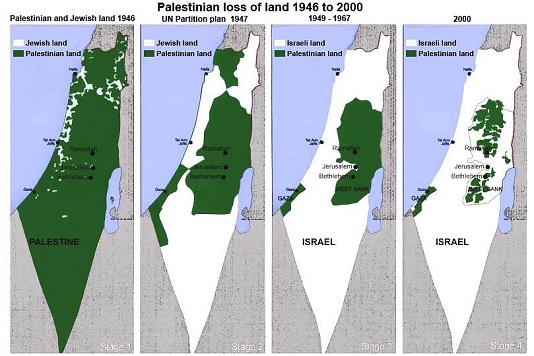Embracing the Land
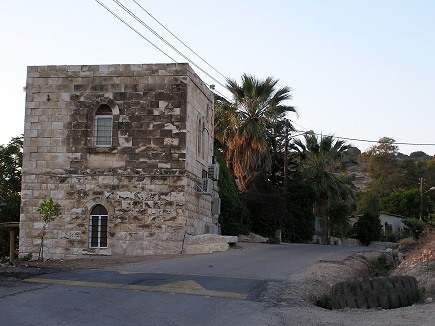
"My home is in Zakariya"
Every morning he wakes up, prays, prepares tea, carries the old tea pot and a small glass and goes to check on his trees and plants. He wanders between the loquat tree and the apple tree and the vineyard, between the jasmine, the sage and the thyme bushes.
He checks on them, waters them, removes unwanted weeds and collects some mint for his tea. He then sits in a corner, under the shade of the loquat tree, sips his hot tea and watches the leaves dance with the cool morning breeze. All his life he had been a villager, a farmer, a land-worker, a land-lover. His father and grandfather and forefathers before him were villagers, farmers, land-workers and land-lovers. They all used to wake up with the first rays of sunlight, often race the sun to the land. They, his father, grandfather and forefathers, all planted olive trees, apple trees, carob trees, loquat trees, apricot trees and fig trees and created a green heaven, a paradise, a home.
They all worked the vast areas of the land that was and is theirs, the land that was and is part of them and they part of. Be it summer or winter, they planted the fertile land, cared for her and she rewarded them every season with successful harvests. They lived on the land and from her and they gave the land their love, watered her with their sweat and their blood, honoured her, and the land gave them food on their tables, a sanctuary and a home.
They were content and needed nothing else, for they had the land and land gave them everything they needed. They existed through the land and the land existed through them. The land gave them existence.
“Come” she said “I want to show you something”.
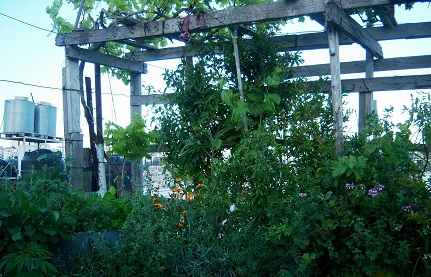
I followed her up the stairs not knowing what awaited me. It was I think a 3 or a 4 floor building, originally two rooms built by the UNRWA, which with time, expanded and grew, just like the family inhabiting these two rooms. Now, the little children who grew up in the over-crowded UNRWA rooms had their own “houses”; apartments in this building, still small and overcrowded, but better than 2 rooms for the dozens that they are. I don’t know how many they are, but at least every brother (not to mention the married sisters who lived elsewhere in the refugee camp and across occupied Palestine) had at least 5 or 6 children. “Not bad”, I would think every time I saw them all gathered, “Palestine needs her children around her and the more the better”.
I followed her up the stairs, expecting everything. I stepped on the roof and was amazed by what I saw. I had expected everything, except this. I was practically transferred to a garden of sorts… no, not a garden, but to Zakariya.
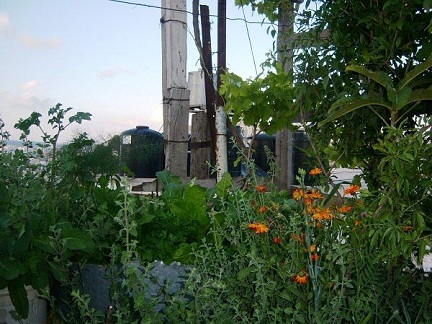
He came, looked around him, stopped in front of every tree and every plant and seemed to be talking to them; saying “good morning” or conversing with them. He touched a fruit, checked its softness “not yet ripe enough”. He rubbed a green leaf between his fingers and touched the soil to see whether the plants needed watering or not. After checking on his “green children”, he went to a corner, filled a plastic water can and started watering them, one by one. And as he moved from one side to the other, I watched him; an old man, over 60… his face wrinkled with the marks of the Nakba, the Naksa, the Intifadas and all that is in-between… his eyes windows to a village not far away, yet so far away, a green village which decades in colourless UNRWA rooms could not erase or replace. He was thin, very thin, and he moved slowly, but steadily. He saw me and smiled. He came towards me and shook my hand; “hello, how are you and how are your parents?” He said in a clear voice. And as I looked into his eyes, I couldn’t help search for the little boy who ran across the fields and followed the goats in a beautiful village over 63 years ago.
He had carried that village with him, within him, all these 63 years of wandering. He is still wandering, and won’t stop until his feet take him back to his village. This refugee camp is a temporary stop, a forced stop, but never a home. It was never and will never be a substitute to the home from which he and the thousands of thousands of refugees were all expelled, it was never and will never be a home. It is simply a refugee camp; a refugee camp, not a home.
“This isn’t our home” I often heard the children here say. “My home is in Jrash” … “My home is in Deir Aban” … “My home is in Zakariya”. They know where their home is, they know where they belong, where their roots reach deep to the heart of the land. They know there can never be a substitute to that home.
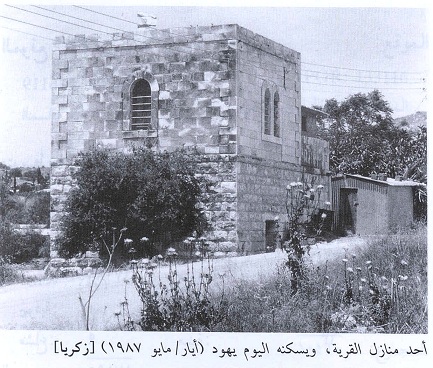
They know that no time, no Zionist, no American president, no European politician, no Arab dictator and no Palestinian traitor can change that. They know that no bullet, no bulldozer, no apache, no F-16, no merkava, no phosphorous bomb can hold them back from reaching their villages and kissing the soil of their lands and rebuilding their homes. They know the land is theirs, will always be theirs, and they know their struggle won’t stop until they return to their homes and lands.
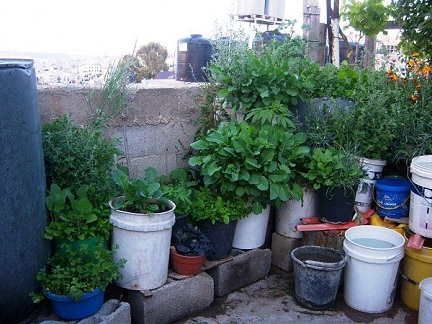
“Here, this is for your mother” he wrapped some roots in a wet piece of cloth and gave them to me “I promised to send her this plant”. As I took the plant, I thought of my mother, a refugee, who has changed one part of our land into a jungle. She didn’t leave one spot without planting a fruit tree, an olive tree, a citrus tree, a flower or a herb bush, you just name it, all planted over each other, all hugging each other, all planted randomly but with much love. And whenever one of the many international activists, who have been visiting us or staying at our home during the last 7 or 8 years, asks us what to bring or send as a “thank you” for the family, we would always have one answer: seeds, flower seeds. Now, we have a garden with plants from everywhere, an international garden, a solidarity garden; a garden that mixes Palestinian plants with solidarity plants from all over the globe: from Europe to North America, from Africa to Australia, from South America to Asia. And if you come to visit, my mother would take you on a tour in this solidarity garden and she would tell you from where each and every plant came and which activist brought it: that British guy with the pony tail, the 2 Jewish American girls who sang non-stop, the South African who loves Maqlubeh, the French Algerian who wanted to pray in Al-Aqsa, the Norwegian who enjoyed running after the goats with the shepherds, the Chilean girl who cried while listening to tales of the Nakba, the Canadian couple who wanted to learn how to make stuffed vine leaves, and many more, as many, as beautiful and as diverse as the flowers in the solidarity garden.
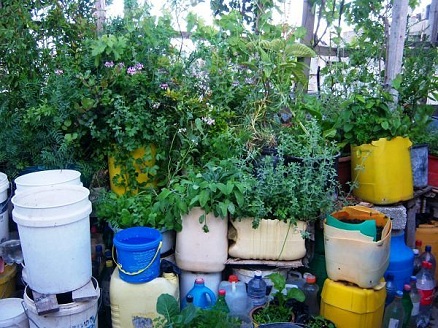
Plastic containers, the ones we use for olive oil and water, and barrels were spread all over the roof, in corners, along the edges, placed near one other, on wooden boxes, some hanging by ropes, and all had plants peeping out of them. Then along one side of the roof, there was a wooden structure, upon which a vineyard grew and stretched itself. Another apple tree hugged the vineyard and a third tree and a fourth one still small, but growing, found a place in that structure. And they were all surrounded by all sorts of herbs: sage, thyme, mint. It was all there; the natural pharmacy of Palestine. We stood there, on the roof, and around us it looked all green, and trees were growing out of the hard concrete. I looked closely, I couldn’t understand how the trees just grew out of the stone. “The roots break through the concrete of my brother’s ceiling in the apartment below us” His daughter explained. If our trees are clinging to this land like this, if our trees are spreading their roots into hard concrete to make their way to the sacred soil of this land, do the Zionist expect us, anyone of us, to forget the land? Do they expect us, anyone of us to tear our bodies away from this land, to bleed ourselves to death? Can’t they see that our bodies are the land and our blood is the roots that will keep us one with this land?
The Zionists expelled and continue to expel Palestinians from their homes and lands, and they believe by doing so they will take that land and that home away from their owners. They don’t know that these homes and these land are within every Palestinian, that every Palestinian carries his/her home within him/her, in his/her heart wherever he/she goes, carries his/her land in his/her veins wherever he/she goes.
We have one home and it is called Palestine, it is not called Jordan, it is not called Egypt, it is not called Lebanon, it is not called Syria, it is not called USA, it is not called Germany, it is not called Australia, it is not called Canada, it is not called Mars, it is not called West Bank and Gaza, it is not called Palestinian Territories. We have one home and it will forever be called Palestine, one home from the Jordan River to the Mediterranean Sea. We have one home and it awaits us.
We have one home and it is called Palestine, it is not called Jordan, it is not called Egypt, it is not called Lebanon, it is not called Syria, it is not called USA, it is not called Germany, it is not called Australia, it is not called Canada, it is not called Mars, it is not called West Bank and Gaza, it is not called Palestinian Territories. We have one home and it will forever be called Palestine, one home from the Jordan River to the Mediterranean Sea. We have one home and it awaits us.
“Look” she said and pointed to some houses below us.
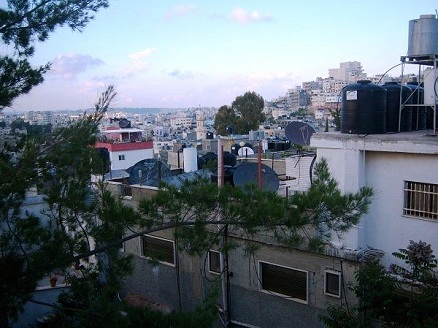
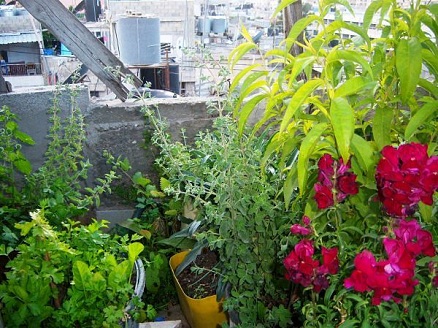
Across the refugee camp, over-crowded houses spread, and all had plants, trees growing out of the rocks, flowers rising through the baton, bushes growing everywhere, making their way through the tents, through the “Zink” houses, the concrete rooms, the expulsion, the massacres, the Nakba, the Naksa and breaking the chains of the refugee camp, breaking the stone, the occupation and the oppression, the resolutions and the concessions, rising towards the sun and spreading their roots towards home.
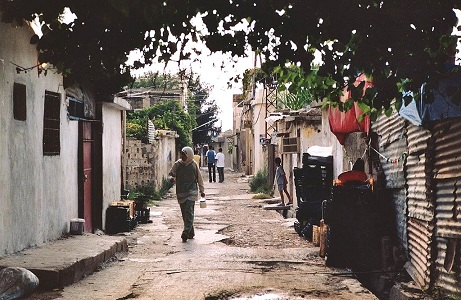
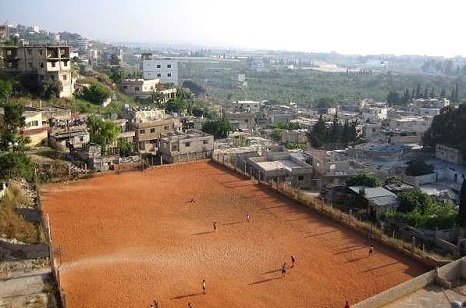
When they were expelled from their lands, they carried these lands with them…. they carried the land within their hearts 63 years…. they carried the olive trees, the apple trees, the carob trees, the fig trees… they carried them within their hearts 63 years … and within 63 years, the trees spread their roots … the trees spread their roots from Dheisheh to Jrash, Zakariya, Deir Aban, Al-Majdal, Ein Karim, Staf, Beit Jibrin, Beit Nattif, Ajjour, Beit I’tab, Allar, Il-Sifla, Tal Il-Safi, Mighlis, Kasla, Khirbit Il-Louz, Khilda, Il-Joura, Il-Falouja, Beit Mahseer, Il-Qabou, Al-Walaja, Ras Abu Ammar, Tal Al-Turmous, Iraq Al-Manshiyyeh, Deir Ad-Dubban… the trees spread their roots from Aida, from Al-Azzah, from Balata, from Jenin, from Nur Shams, from Jabalia, from Rafah, from Al-Bureij, from Al-Fawwar, from Shu’fat, from Al-Jalazoun, from Al-Far’a, from Ein Il Hilweh, from Nahr Il Bared, from Irbid, from Az-Zarqa, from Al-Yarmouk, from Hama… from every refugee camp the trees spread their roots to reach home, they spread their roots to Jerusalem, Haifa, Yaffa, Acca, Beisan, Tarshiha, ‘Allar, ‘Artuf, Bayt ‘Itab, Bayt Mahsir, Bayt Naqquba, Deir Aban, Dayr Yasin, Jrash, Zakariya, Al-jura, Al-Maliha, Al-Qabu, Qalunya, Al-Qastal, Ras Abu ‘Ammar, Al-Bassa, Al-Birwa, Danna, Kafra, Sirin, Al-’Imara, Al-Jammama, Al-Khalsa, Bayt Daras, Isdud, Julis, Al-Jura, Al-Khisas, Al-Jalma, Al-Mansi, Qisarya , Al-Tantura, ‘Ajjur, Bayt Jibrin, Bayt Nattif, Al-Dawayima, Zakariyya, Bayt Dajan, Saqiya, Yazur, Ar-Ramleh, Al-Lajjun, Al-Mazar, Ma’lul, Al-Mujaydil, Saffuriyya, Abu Shusha, Al-Burj, Dayr Ayyub, Qazaza, Al-Lydd, Al-Dawwara, Kafr Bir’im, Sa’sa’, Yarda, Hittin, Lubya, Al-Majdal, Fardisya, Al-Jalama, Wadi Qabbani and every spot, every grove and every field between the River and the Sea.
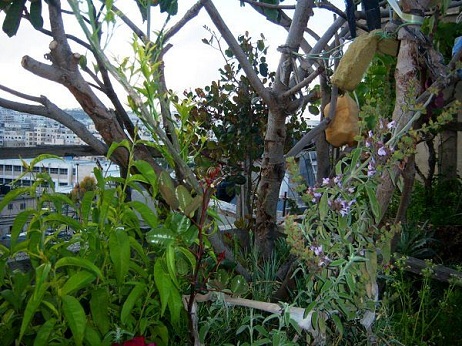
The trees spread their roots towards every village in occupied Palestine, forming a link between the lands and their owners, the homes and their owners, an unbreakable link, unchangeable through time and space, a link that cannot be bought or sold, that cannot be negotiated or relinquished, a link as old as our history in this land, as strong as our love of this land. And because Palestinians are one with the land, every generation is the roots that will keep the next generation alive, connecting it with the land, connecting it with the mother of us all, connecting it with Palestine.
___________________________________________________________________________________
Published here: My Palestine
Submitted by: Uprooted Palestinians [Nahida Izzat]
URL: http://www.a-w-i-p.com/index.php/2011/08/06/embracing-the-land

























